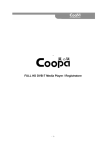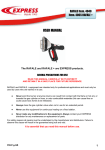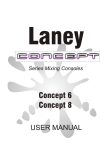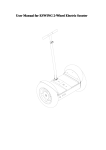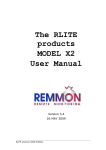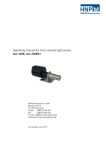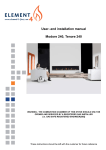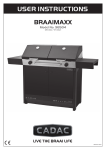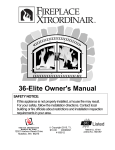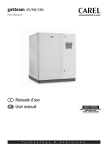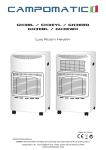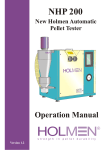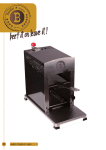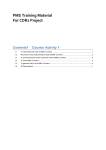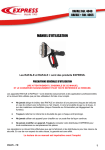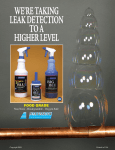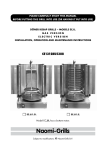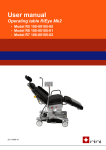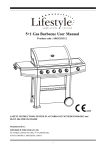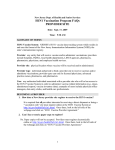Download English User Manual
Transcript
Happy Cocooning COCOON TABLES ASSEMBLY INSTRUCTIONS AND SAFETY GUIDE U 10BU SRRSO65xx/I2+ & SRRSO40xx/I2+ SERIES SRS6510/I2+ & SRS4010/I2+ SRS6504/I2+ & SRS4004/I2+ SRR6501/I2+ & SRR4001/I2+ 0063/11 SRRSO65xx/I2+ Σ QN= 19 kW, 1383 g/h I3+(28-30/37), I3 B/P(30), I3 B/P(50), I2L & I2H/I2E/I2E+ SRRSO40xx/I2+ Σ QN= 12 kW, 874 g/h I3+(28-30/37), I3 B/P(30) & I3 B/P(50) & I2L SRRSO40xx/I2+ Σ QN= 13 kW, 747 g/h I2H/I2E/I2E+ BE, CY, CZ, EE, GR, IT, IE, PT, ES, LU, GB, FR, IS, LT, PT, SK, CH: Cat. I3+ Butane(G30)=28~30 mbar, Propane(G31)=37 mbar, Injector-SRRSO65xx:2.2 mm SRRSO40xx:1.65mm. CY, CZ, DK, EE, FI, GR, LV, LT, LU, MT, NL, NO, SK, SI, SE, TR, HU: Cat. I3 B/P(30)=Butane and Propane mixtures at 30mbar, Injector-SRRSO65xx:2.2 mm SRRSO40xx:1.65mm. AT, DE, SK, CH: Cat. I3 B/P(50)=Butane and Propane mixtures at 50mbar, Injector-SRRSO65xx:1.9mm SRRSO40xx:1.45mm. AT, BE, CH, CZ, DE, DK, EE, ES, FI, FR, GB, GR, HU, IE, IT, LT, LU, LV, NL, NO, PL, PT, RO, SE, SI, SK: Cat. I2L Natural Gas(G25) at 25mbar, Injector- SRRSO65xxI2+: 4.1mm SRRSO40xxI2+: 3.0mm; I2H/I2ENatural Gas(G20) at 20mbar, and I2E+ Natural Gas(G20) at 20mbar, Natural gas(G25) at 25mbar; Injector- SRRSO65xxI2+: 3.65mm SRRSO40xxI2+: 3.0mm “ Only nationally approved hose and regulator corresponding to the appliance category and pressure must be used ” 24B This manual is for: AT, CH, DE PIN NO.: 0063BT7387 25B FOR OUTDOOR USE ONLY 26B Read the instructions before using the appliance 32B Warning: Accessible parts may be very hot, keep young children away. 1B ASSEMBLY AND USER INSTRUCTIONS 11B FOR OUTDOOR GAS FIRE PITS 12B USING LIQUEFIED PETROLEUM GAS Your new Cocoon Table SRRSO65xx/I2+ & SRRSO40xx/I2+ is made from the highest quality materials, and produced under strict manufacturing controls. Please read the Instructions for assembly before commencing, and follow the instructions for use carefully. We congratulate you on your decision to buy this outdoor gas grill and wish you great fun when warming with it. PLEASE READ THESE SAFETY INSTRUCTIONS IN FULL BEFORE COMMENCING ASSEMBLY. Important Safety instructions The fire pit is safe and easy to use. The following rules must be followed. 1. Ensure that the unit has been assembled correctly according to the instructions. 2. Never loosen, or allow the gas connection to become loose. Should this happen, immediately ensure that the gas is turned off, and then re-check the security of the connection. 3. The appliance shall be kept away from flammable materials. 4. Read the Users instruction, Sections, and instructions written on the fire pits, refer to them whenever necessary. 5. Never leave the fire pit unattended while using. 6. In the event of a gas leak, turn off gas supply at the LPG cylinder or the main shut off valve of city network gas. 7. Keep children well clear while fire pit is in use and after use until it has cooled. 8. Keep warming area clear of combustible materials and/or liquids. 9. Never obstruct free flow of air to the fire pit, or alter/adapt the fire pit to suit any other situation. 10. SRRSO65xx & SRRSO40xx: A hose conforming to the national standard must be connected at one end to the LPG regulator and at the other to the fire pit nipple using hose clips. The hose length is 2.5m. For the hose exposed, please be sure to use (a) rubber/PVC layer(s) to cover on it to prevent people from stumbling. The proper rubber/PVC layers are available from the same dealer. SRRSO65xxI2+ & SRRSO40xxI2+: A hose conforming to the national standard must be connected at one end to the main shut off valve of city network gas and at the other to the 1 fire pit inlet with a national standard NG connector. For the hose exposed, please be sure to use (a) rubber/PVC layer(s) to cover on it to prevent people from stumbling. The proper rubber/PVC layers are available from the same dealer or qualified installer. 11. Lead the hose away from the fire pit without twisting it. Do not let the hose touch the hot surface. 12. Never change the air valve settings of the burner. 13. Every time the gas connection is reconnected do a leak test. 14. That parts sealed by the manufacturer or the agent must not be altered by the user. 15. Any modification of this gas fire pit may be dangerous. 16. Do not move this fire pit during use. 17. Turn off the gas supply after use. 18. Do not touch the logs or lava rocks until they cool down. 19. This appliance is intended for warming purposes. 20. This appliance has a naked flame, a suitable guard should be used for the protection of young children, the elderly and the infirm. 21. When first use, preheat the lava rocks for 15 minutes to burn out the impurities and air in the natural lava rocks. Contents 13B 1. Technical Data 2. Instructions for assembly 3. Installation and operation instructions 4. Maintenance Page 2-3 Page 4-7 Page 8-11 Page12-16 14B 15B 16B 17B 18B 19B 20B 21B The gas fire pits are I3+(28-30/37), I3 B/P(30) ,I3 B/P(50), I2L(G25) & I2H/I2E/I2E+(G20) appliances, designed to operate on Butane at 28/30mbar, Propane 37mbar, B/P 30/50mbar, I2L at 25mbar & I2H/I2E/I2E+ at 20mbar. Gas consumption, pressures and injectors orifices sizes are shown below: 33BU SRRSO65xx/I2+ GAS FIRE PITS Injector Orifice Heat Input(Hs) 34B I3+(28-30/37), I3B/P(30) 2.2mm 37B I3 B/P(50) 39B 1.9mm 19 kW 42B I2L 43B 4.1mm 45B I2H/I2E/I2E+ 19 kW 38B 41B 49B 35B 19 kW 46B 47B 3.65mm 19 kW 50B 51B 2 36B Gas Rate 1383 g/h 40B 1383 g/h 44B 2.1m3/h 48B 1.8m3/h 52B 53BU SRRSO40xx/I2+ GAS FIRE PITS Injector Orifice Heat Input(Hs) 54B I3+(28-30/37), I3B/P(30) 57B I3 B/P(50) 61B I2L 65B I2H/I2E/I2E+ 69B 55B 1.65mm 12 kW 58B 59B 1.45mm 12 kW 62B 63B 3.0mm 12 kW 66B 67B 3.0mm 13 kW 70B 71B 56B Gas Rate 874 g/h 60B 874 g/h 64B 1.3m3/h 68B 1.2m3/h 72B LP Gas Regulator A gas regulator confirming to the national standard must be fitted to the gas cylinder to provide the appropriate gas pressure. The supply pressure of the LPG regulator must comply with the table blow: I3B/P(30) I3B/P(50) I3+ LPG LPG Butane Propane 28~30mbar 50mbar 28~30mbar 37mbar Do Not use this appliance with an adjustable regulator. We suggest use this appliance with LP gas cylinder of 10KG. 22B 2 Instructions for assembly Read these instructions through carefully before commencing assembly, and then follow them step-by-step. 23B 3 SRRSO65xx/I2+ & SRRSO40xx/I2+ series- parts list No. Description Q’TY No. Description Q’TY 01 Knob 1 21 Aluminum tube 1 02 Valve 1 22 Thermocouple 1 03 SS flexible tube 1 23 Pulse battery box 1 04 Injector fitting 1 24 Pipe clamp 1 05 Prop plank 1 25 Inlet fitting 1 06 Fix plank, Burner plate 3 26 Nut, Inlet fitting 1 07 Igniter needle 1 27 Igniter box 1 08 Burner plate 1 28 Lava rock, 1 09 Fix plank, Burner head, top 2 29 Log set 4 10 Pilot Igniter 1 30 Nut M8 6 11 Burner head 1 31 Screw M8F40 1 12 Fix plank, Burner head, bottom 1 32 Nut M6 2 13 Windpipe 1 33 Screw M5F20 6 14 Windscreen 1 34 Nut M5 6 15 3 35 Washer 4 16 Nut, Pilot Igniter 1 36 Screw M4F08 6 17 Washer 1 37 Control panel 1 18 Spring 1 38 Pit body 1 19 Support plank 1 39 Gas Inlet fitting 1 20 Contactor 1 Support tube, Burner plate, bottom 4.5KG, 6KG Note: The part No. 39 is for SRRSO65xxI2+ and SRRSO40xxI2+ series only. 4 SRS6510/I2+ & SRS4010/I2+ series- exploded 5 SRS6504/I2+ & SRS4004/I2+ series- exploded 6 SRR6501/I2+ & SRR4001/I2+ series- exploded 27B 28B 29B 7 ASSEMBLY INSTRUCTIONS U GAS HOSE CONNECTIONS Two adults will be needed, to assist each other with assembly. SRRSO65xx & SRRSO40xx: Upraise the fire pit and attach the hose to the manifold inlet nipple and tighten hose clip, or secure the hose to the manifold inlet fitting as shown in FIG.01 & FIG.02 below. SRRSO65xxI2+ & SRRSO40xxI2+: Upraise the fire pit and attach the hose to the manifold inlet fitting with a national standard NG connector and secure the hose to the manifold inlet fitting as shown in FIG.03 below. NOTE: Installation and service must be performed by a qualified installer, service agency or your gas provider. FIG.01 FIG.02 FIG.03 8 ASSEMBLY INSTRUCTIONS U INSTALLATION OF LAVA ROCKS AND LOGS Unpack and put the lava rocks on ground. Pick up the solid lava rocks then layer them in level across the burner plate. Bring it up to a level that is just over top of the burner by about 1”. Do not completely cover burner element or block the igniter box with lava rock. Next, install the imitation fire logs. These should be laid in as shown in the image below. Start by laying one log in the centre of the unit. This log should be perpendicular to the igniter box and lay on top of the centre support bracket. Lay the other logs, (quantity may vary by unit type), in a teepee configuration over the first log. It is important that the logs not lay directly on top of the burner. By blocking the burner it will impact air flow and will cause the unit to be difficult to ignite or will impact how the flame comes through and burns. Once all the logs are in place as shown you can begin next steps. NOTE: Be sure unit is cool before touching any of the components. NOTE: When first use, preheat the lava rocks for 15 minutes to burn out the impurities and air in the natural lava rocks. 9 30B ASSEMBLY INSTRUCTIONS INSTALLATION OF GAS CYLINDER ENCLOSURE 73BU After the well connection to the gas supply cylinder, put the enclosure onto the gas cylinder then cover with the lid. Align the hose pipe through the holes of passages at the bottom of the fire pit and the enclosure as shown in the image below. Note: For the hose exposed, please be sure to use (a) rubber/PVC layer(s) to cover on it to prevent people from stumbling. The proper rubber/PVC layers are available from the same dealer. 10 31B ASSEMBLY INSTRUCTIONS 74BU INSTALLATION OF CITY NETWORK GAS Upraise the fire pit and attach the manifold inlet fitting with the national standard NG connector supplied. Connection of the NG supply to the appliance inlet should be made by a qualified installer. Note: For the hose exposed, please be sure to use (a) rubber/PVC layer(s) to cover on it to prevent people from stumbling. The proper rubber/PVC layers are available from the same dealer or qualified installer. 11 NOTICE TO INSTALLER; THESE INSTRUCTIONS MUST BE CONVEYED TO AND REMAIN WITH THE HOMEOWNER Outdoor Gas Fire Pits INSTALLATION AND OPERATION INSTRUCTIONS FOR OUTDOOR GAS FIRE PITS WARNING: If the information in these instructions is not followed exactly, a fire or explosion may result causing property damage, personal injury or loss of life. Do not store or use gasoline or other flammable vapors and liquids in the vicinity of this or any other appliance. WHAT TO DO IF YOU CAN SMELL GAS FUMES: Do not try to light any appliance. Do not touch any electrical switches. Do not use any phone, (including cellular phones) Immediately call your gas supplier from a neighbor’s phone. Follow the gas supplier’s instructions. If you cannot reach your gas supplier, call the fire department. Installation and service must be performed by a qualified installer, service agency or your gas provider. WARNING WARNING: Improper installation, adjustment, alteration, service, or maintenance can cause injury or property damage. Read the installation, operating and maintenance instructions thoroughly before installing or servicing this equipment. WARNING WARNING: FOR OUTDOOR USE ONLY. 2B WARNING DO NOT LEAVE ANY OUTDOOR GAS APPLIANCE UNATTENDED WHEN IN USE OR HOOKED UP TO A FUEL SUPPLY 3B WARNING DISCONNECT WHEN NOT IN USE AND KEEP OUT OF REACH OF CHILDREN 4B GENERAL INFORMATION WARNING This appliance shall be used ONLY outdoors in a well- ventilated space and shall NOT be used inside a building, garage, or any other enclosed area. 5B WARNING This appliance is not approved as a cooking device and should not be used as such. 6B WARNING THIS UNIT IS NOT FOR USE WITH SOLID FUELS. 7B WARNING Cylinders must be stored outdoors in a well-ventilated area out of reach of children. Disconnected cylinders must not be stored in a building, garage or any other enclosed area. 8B 12 WARNING Storage of this appliance indoors is permissible only if it has been disconnected from its fuel supply 9B Always keep the appliance area clear and free from combustible materials, gasoline, and other flammable vapors and liquids. Installation and repair should be done by a qualified service person. The appliance should be inspected before use and at least annually by a qualified service person. More frequent cleaning may be required as necessary. It is imperative the control compartment, burner and circulation air passageways of the appliance be kept clean and free. If it is evident there is excessive abrasion or wear of any of the components, if the fuel supply hose is cut or cracked, it must be replaced prior to the appliance being put into operation. Children and adults should be alerted to the hazards of high surface temperatures and should stay away to avoid burns or clothing ignition. Young children should be carefully supervised when they are in the area of the appliance. Clothing or other flammable materials should not be hung from the appliance, or placed on or near the appliance. Any guard or other protective device removed for servicing the appliance must be replaced prior to operating the appliance. Inspect the fuel supply connection and all gas tubes for signs of leakage before each use of the appliance. The pressure regulator and hose assembly supplied with LP models must be used. Replacement pressure regulator and hose assemblies must be those specified in this manual. To connect the gas bottle to the unit: Appropriate Regulators are available from the same dealers, for fitting to the hose supplied with this unit. . Ensure that all connecting threads and surfaces are undamaged, clean and free from oil dirt. When fitting the hose make sure that it is free from twisting, kinks or sharp bends. Do not allow the hose to touch any hot surface or sharp edges. 2. Attach the regulator to the gas cylinder. Refer to the instructions supplied with the regulator for details regarding fitting. 3. Test for gas leaks. Do a leak test each time the cylinder is installed, whether or not it has been filled. Check all other joints and gas tubes at least once a year. lf the hose shows deterioration or damage, leak test the entire outer surface, while under pressure. Replace at first sign of leak or age cracking. Remember to turn the cylinder valve OFF before removing the hose. To connect the city network gas to the unit: 1. Attach the hose to the manifold inlet fitting with a national standard NG connector and secure the hose to the manifold inlet fitting. Ensure that all connecting threads and surfaces are undamaged and clean. When fitting the 13 hose make sure that it is free from twisting, kinks or sharp bends. Protect the hose from any sharp edges. 2. Attach one end of the hose to the main shut off valve of city network gas. 3. Do a leak test each time when the gas connection is reconnected. lf the hose shows deterioration or damage, leak test the entire outer surface. Remember to turn the city network gas OFF before removing the hose. Testing for Leaks 1. Ensure knob is OFF and open the cylinder valve. 2. Use a solution of half detergent and half water for leak testing. Brush solution on each connection and check for bubbles. 3. lf a leak is present, turn off the gas supply and tighten the loose joint. 4. lf leak persists contact an authorized agent. INSTALLATION The gas cylinder enclosure, log set and crushed lava rock are shipped together on applicable models. Remove the log set and un-pack all components. Check for damage caused by freight / transport. DO NOT install damaged components. The logs are fragile use care when handling. Place the fire pit on a level/secure surface in a desired location. The location must be adjacent to the gas supply cylinder. After the well connection to the gas supply cylinder, put the enclosure onto the gas cylinder then cover with the lid. NOTE: Minimum clearances: 1 meter to combustible construction must be maintained. You must have clear and easy access to the on/off valve AFTER the appliance is installed and connected to the gas supply in order to safely turn of the burner. THE ON/OFF VALVE IS USED TO TURN THE BURNER ON AND OFF. 1. Cylinder should be positioned on a flat level surface near the fire pit, but within the predescribed safe distance 1 meter away. 2. Make sure the tank valve is in its full off position. 3. Never attempt to use damaged or plugged equipment. See your local LP Gas Dealer for repairs. 4. Connect and tighten the end to the gas regulator with the clip. 5. When connecting regulator assembly to the tank valve, hand tighten it to a positive stop. 6. Locate the hose out of the pathways where people may trip over it or in areas where the hose may be subjected to accidental damage. 7. Open tank valve fully. Turn the on/off valve at the unit to the ‘off’ position to pressurize the hose assembly. Use a soapy water solution to check all the connections between the gas tank connection and the ball valve at the back of the control panel for leaks before attempting to light the appliance. If a leak is found, turn the tank valve off and do not use the appliance until repairs can be made. Note that the unit must be turned upside-down to perform this examination. It is also important to remove battery from igniter before performing any leak testing by unscrewing the push-button knob at the control panel. Perform leak test in a well ventilated area outside and where no source of spark can occur. 8. If everything is secure and leak free to this point you are ready to light your fire pit. Read OPERATION instructions. 14 OPERATION Upon completing the gas line connection, a small amount of air will be in the lines. When the first lighting the burner, it will take a few seconds for the lines to purge themselves of this air. Once the purging is complete, the burner will light and operate as indicated in the instruction manual. Subsequent lighting of the appliance will not require such a purging unless the gas supply has been disconnected. WARNING: Read and follow the safety and lighting instruction page in this manual and on the labels on the appliance. BY NOT FOLLOWING INSTRUCTIONS, A FIRE/ EXPLOSION MAY RESULT. YOU MAY BE SERIOUSLY INJURED. BASIC SET UP Once the fire pit is in position, level and safely hooked up to the proper fuel supply, it is now time to install the crushed lava rock. This is also an essential part of the overall set-up as it will impact the way the unit burns if not properly installed. Layer the lava rock in level across the burner plate. Bring it up to a level that is just over top of the burner by about 1”. Do not completely cover burner element or block the igniter box with lava rock. Next, install the imitation fire logs. These should be laid in as shown in the image above. Start by laying one log in the centre of the unit. This log should be perpendicular to the igniter box and lay on top of the centre support bracket. Lay the other logs, (quantity may vary by unit type), in a teepee configuration over the first log. It is important that the logs not lay directly on top of the burner. By blocking the burner it will impact air flow and will cause the unit to be difficult to ignite or will impact how the flame comes through and burns. Once all the logs are in place as shown you can begin next steps. NOTE: Be sure unit is cool before touching any of the components. FOR YOUR SAFTY READ BEFORE LIGHTING A. Before operating smell all around the appliance area for gas odors and next to the floor because some gases are heavier then air and will settle on the floor. B. Use only your hand to turn the manual gas control valve. Never use tools. If the valve will not turn by hand, do not try to repair it. Call a qualified service technician. Force or attempted repair may result in a fire or explosion, C. Do not use this appliance if any part has been under water. Immediately call a qualified service technician to water. WHAT TO DO IF YOU SMELL GAS Do not try to light any appliance. Do not touch any electric switch; do not use any phone in your building. Immediately call your gas supplier’ from a neighbors phone. Follow the gas supplier’s instructions. If you cannot reach your gas supplier, call the fire department. LIGHTING INSTRUCTIONS 1. Remove protective storage cover and locate the manual gas control valve and igniter button on the fire pit. 2. Make sure fuel supply is properly connected and turned on at the source / tank. 15 3. Depress igniter button until you hear it sparking. You will hear a small popping noise. If you do not hear the igniter sparking you may need to replace the battery. Replace with a standard AAA battery, directly behind the rubber push button knob, (unscrew knob to access battery). Keep igniter button pushed in while pushing then turning the fuel flow valve to the ON/Low flow position at the fire pit. The jet pilot fire should light the burner within 15 seconds; after the burner lit, release the igniter button but still keep pushing the fuel flow valve for 20 seconds to allow the thermocouple to function. After the 20 seconds, release the fuel flow valve; if the burner keeps lit, you can adjust the flame to HI. However, if the flame extincts after the fuel flow valve released, Re-try or go to trouble-shooting and start from Step-1 again. TO TURN OFF GAS Turn the ON/OFF valve to the off position at the unit, then turn the valve on the LP tank, or the main shut off valve of natural gas system, to the OFF position. MAINTENANCE 1. The appliance should be inspected before initial use and inspected and cleaned at least annually by a qualified service person. 2. Tampering is DANGEROUS and voids all warranties. Any component that is found to be faulty, must be replaced with an approved component. 3. To obtain proper operation, it is imperative that the burner flame characteristics are constant, not lifting or floating. For a clean burn the unit is designed to run at full flow. If not operating at full fuel flow black smoke may start to occur. Always operate at full fuel flow to burn clean and prevent smoke. Dirty logs can be easily cleaned off with water and light soap. 4. Periodically remove the logs and examine the burner and its components. If dirty, clean with a soft brush and soapy water solution. Also examine the area around the burner. Any dirt or foreign material, such as spider webs or nests in this area should be removed. This will ensure long life, safe and trouble free operation. 5. Periodically check the hose connecting the LP gas cylinder to ensure it is not cracked or damaged in any way. NOTE: Carbon (soot) may built up on the surface of the logs over time or with extended use. This is more likely to occur when using LP gas. The soot should be cleaned off the surfaces of the imitation logs periodically to prevent excessive build up. To clean the logs, be sure the fire is out, the gas supply is turned off and the logs are cool to the touch. The soot can then be brushed of with a dry bristle brush or cloth. Take care while cleaning the logs as they can become damaged if mishandled. Care should be taken to dispose of the soot and the cleaning materials properly. Keep away from clothing and outdoor furniture. During the cold winter months or in colder climates, it is recommended to disconnect the fire pit and store it in a cool dry place. Do not store the LP gas tank inside. For the balance of the year, protect and cover your fire pit from the rain, freezing rain or heavy snow by using the custom cover than comes with the kit. Before installing the cover make sure the unit is shut off, that the gas lines are disconnected and that the unit has had sufficient time to cool. Install the cover and use the tie-down straps to secure it tightly to the unit to prevent the wind from blowing it off. Produced on behalf of: HAPPY COCOONING B.V. Provinciënbaan 1 5121 DK Rijen 16 The Netherlands Tel: +31 (0) 161 750270 Fax: +31 (0) 161 750375 17



















